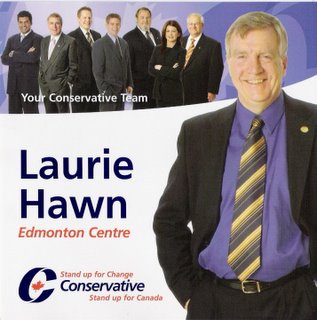Tories reopen same-sex marriage debateThat didn't take long. I was hoping for at least a few days to hammer my thoughts out on this issue before it made headlines.
What I do think now is this is what's going to be remembered as Stephen Harper's 'big gamble' of the campaign. If he succeeds, he'll be hailed as a political genius (see reasons below) and if he fails, he'll be accused of destroying the Conservative movement for years. As big as the stakes are, let's look at it dispassionately for a moment. My own reading of the polls on this issue in recent years is that 40% of Canadians are very open to, and supportive of, gay marriage, about 40% are generally opposed to it, and the other 20% waffle one way or the other depending on how the question's phrased, who's been commenting in the media on it, etc. So I understand Mr. Harper's sensing an opportunity here and that opportunity is magnified by the fact that all the other parties are on the other side of the fence from the Conservatives on this.
In 1988, Brian Mulroney made used of united opposition to free trade and won a majority government. In 1992, Preston Manning's Reform party broke away from the rest of the Canadian political establishment and campaigned openly against the Charlottetown Accord and the resulting victory for the 'No' side established the Reform Party as a serious political force in this country. I'm betting that Stephen Harper (who's no fool, whatever else he is) remembers those events very clearly and is betting that he can follow in those footsteps.
But it is a gamble (just as it was in '88 and '92). Still looking at it dispassionately, is this really an issue that's a vote-getter? Are Sikhs, Muslims and others who've voted Liberal for years suddenly going to vote for Mr. Harper and his party based on this one issue? Even if he's also chanting 'Gomery, Gomery, Gomery' all day? After all, even when Ontario MP, Pat O'Brien, left the Liberal caucus over the issue last June, he still chose to sit as an independent rather than join the Conservatives... In other words, Liberals abstaining because of this issue may not be enough to lift Mr. Harper into the 35%+ range of the popular vote that he'll need to form (even a minority) government.
But if my head's telling me that this is deep (though risky) strategy, my gut's churning... Why? Well for one thing, while the electorate, as a whole, may be sitting at 40/40/20 on gay marriage, if you look at the under-30s, it changes diametrically to something like 75/10/15. In other words, there's a profound generational shift in thinking on it's way and opposition to gay marriage may soon look as dated as opposition to a woman's right to choose (or vote) or to racial segregation or even slavery, which have all been defended by conservatives of one form or another in the last couple of centuries... In other words, the Conservative Party, to gain a temporary tactical advantage in one or two elections, may be throwing away an opportunity (perhaps it’s last opportunity?) to connect with the voters of tomorrow...
So which is right, head or gut? I wish I knew. All I can say for certain is I'm beginning to think that beneath his bland, policy-wonk exterior, Mr. Harper has the heart and soul of a riverboat gambler. It's not necessarily a bad trait, sometimes even an essential one in a strong leader; and I admit that I used to respect Mr. Mulroney's determination to 'roll the dice' even when I didn't agree with some of the stakes or games he was playing in. And, after all, it was Julius Caesar, crossing the Rubicon who said "Let the dice fly high!" I guess only time will tell if the little Han Solo voice in my head saying "I have a bad feeling about this...' is right or not.
One last thing, I think Égale Canada and other gay rights groups will be making a
BIG error if they think that because of this summer's vote in Parliament that the matter is closed and 'it's time to move on'. Because, in my humble opinion, nothing doomed the Charlottetown Accord more than the oft-expressed consensus in the media and political establishments that Canadians had to accept the deal or face ruin. And nothing is more apt to enrage/motivate a Canadian voter than to tell them that the decision's already been made and how silly or stupid they are not to recognize it and ‘move on’.


